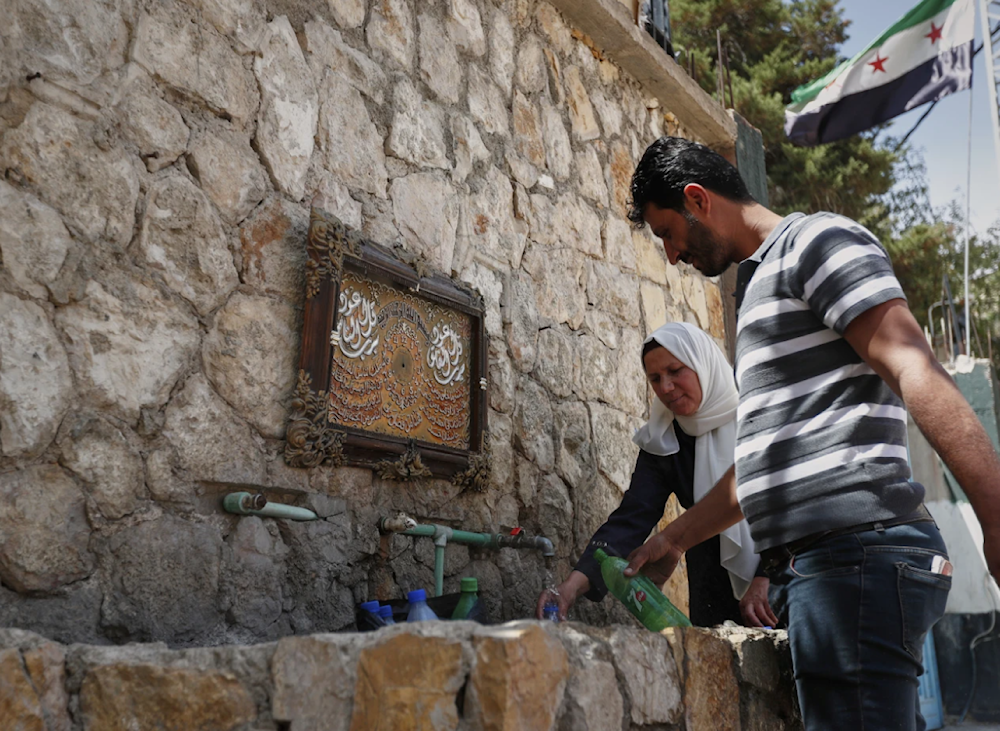EU greenlights lifting of all economic sanctions on Syria
The EU ends broad economic sanctions on Syria after the ouster of Bashar al-Assad, while maintaining targeted measures and warning against setbacks to democratic reforms.
-

Visitors fill bottles with water from the spring in Ein el-Fijeh, Barada Valley, Syria on May 8, 2025. (AP)
European Union countries agreed on Tuesday to lift all economic sanctions on Syria in an effort to support the country’s recovery following the ouster of President Bashar al-Assad, according to diplomats.
"We want to help the Syrian people rebuild a new, inclusive and peaceful Syria," Kallas said in a post on social media platform X following discussions with ministers in Brussels.
"The EU has always stood by Syrians throughout the last 14 years - and will keep doing so," Kallas said.
The deal was reached by ambassadors from the EU’s 27 member states. The move follows the US decision announced by President Donald Trump last week to lift American sanctions on Syria.
Syrian Foreign Minister Assad al-Shibani thanked the EU for lifting its economic sanctions on his country.
Al-Shibani said in a post on X that the decision would bolster Syria's security and stability.
Syria’s new leadership has been pressing for an end to the sweeping international sanctions imposed during al-Assad's presidency.
The EU agreement would end measures that had cut Syrian banks off from the global financial system and frozen the central bank’s assets.
However, diplomats noted that while broader economic sanctions will be lifted, new individual sanctions will target those accused of inciting ethnic tensions, particularly in the wake of deadly attacks on the Alawite minority.
Sanctions directly aimed at al-Assad-era figures and restrictions on arms or dual-use equipment that could be used to suppress civilians will remain in place.
Tuesday’s decision builds on an earlier step taken in February when the EU suspended some sanctions on key Syrian industries. Officials warned that sanctions could be reimposed if Syria’s new leadership fails to uphold minority rights or deviates from a democratic transition.
Alawite Council rejects Syria’s Transitional Justice Commission
The Office of Coordination and Public Relations for Local and International Affairs of the Supreme Alawite Islamic Council in Syria and Diaspora has rejected the legitimacy of the recently announced National Commission for Transitional Justice, questioning both the authority under which it was created and its narrowly defined mandate.
In an official statement, the committee asserted that “it is neither within the rights nor the authority of the head of the de facto authority to form such a body,” declaring that the decree establishing the commission is “null and void” due to the lack of legislative power.
It also criticized the commission for focusing solely on violations committed by the former regime while ignoring “crimes committed by opposition and revolutionary forces,” as well as those perpetrated against Alawite and Druze communities following the regime’s fall.
The committee stated that “transitional justice in Syria can only be achieved through a UN Security Council referral to the International Criminal Court, or by establishing a special international investigation commission and court for Syria, one that includes Syrian judges from all sides.”
It added that any justice framework must eventually be presented to the Syrian people in a national referendum, allowing them to decide between “general amnesty or limited accountability for top criminals from all sides.”
The council emphasized that transitional justice should never become an act of vengeance. “Under no circumstances should amnesty include wealth accumulated by criminals at the expense of the Syrian people's resources,” the statement read.
Furthermore, the committee accused the commission of deliberately excluding acts of genocide and violence committed against minorities, particularly the Alawite and Druze communities, after the collapse of the previous regime.
It also called for a just process that prioritizes deterrence, reparations, reconciliation, and institutional reform, warning that a one-sided or politicized mechanism risks undermining the legitimacy of future accountability efforts.

 4 Min Read
4 Min Read









